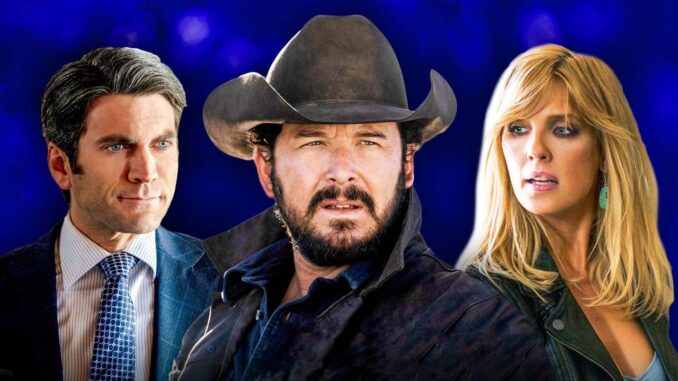
Inside the Yellowstone Spinoff: What Carter’s Return Means for Dutton Ranch
The sprawling, sun-baked canvas of the Dutton Ranch is more than just land; it's a character forged in blood, loyalty, and an unyielding will to survive. As the original Yellowstone saga draws to its close, the whispers of a new chapter, a spinoff, inevitably turn to the fate of its enduring symbols. Among the most intriguing figures poised to step into this unwritten future is Carter, the young, ostensibly orphaned boy taken in by Beth and Rip. His anticipated return, not merely as a peripheral character but as a potential anchor, carries profound implications for the very soul of the Dutton Ranch, suggesting a future that is both a reflection of its brutal past and a tentative step towards an unexpected legacy.
Carter’s journey to the Duttons was anything but idyllic. Plucked from a juvenile detention center, scarred by a life of neglect and loss, he arrived at the ranch a raw, resentful lump of clay. Beth, in her inimitable, caustic fashion, became his reluctant, often cruel, yet undeniably fierce guardian. Rip, with his quiet strength and unwavering dedication to the land, taught him the rhythm of ranch life – the grueling work, the unspoken codes, the loyalty demanded by the brand. Carter’s early struggles, his earnest attempts to learn how to rope, muck stalls, and simply belong, were the crucible that began to forge him. Unlike the born-and-bred Duttons, burdened by a legacy they inherited and often resented, Carter chose the ranch, or rather, was chosen by it. His return, therefore, isn't just a character re-entry; it signifies the resilience of the ranch’s unique ecosystem, capable of transforming the lost and wayward into its most ardent protectors. He represents the land’s enduring power to claim and shape those who commit to it, regardless of bloodline.
For Beth and Rip, Carter’s return is more than just the reunion with their surrogate son; it is a profound echo of their own vulnerabilities and an anchoring point in their tempestuous lives. Beth, who often uses her sharp tongue and brutal honesty as a shield, allowed herself to love Carter, exposing a tenderness rarely seen. He became her desperate, unspoken hope for a future she believed herself incapable of having. His presence forced her to confront her own demons, to consider something beyond chaos and revenge. Rip, the epitome of Dutton loyalty, found in Carter a quiet reflection of his own youthful self – a boy yearning for family and purpose. Carter's return suggests that this fragile, hard-won family unit, forged in the fires of shared trauma and unwavering devotion to the ranch, might just be the cornerstone of the spinoff. It implies that the emotional core of the series will continue to pulse through the very human, flawed relationships that sustain the idea of the Yellowstone, offering a counterpoint to the relentless power struggles that often define it.
Beyond the emotional tapestry, Carter’s return holds significant strategic meaning for the Dutton Ranch. With the original generation of Duttons aging, and the succession lines often murky or fraught with internal conflict (Jamie’s betrayal, Kayce’s wavering commitment), Carter represents an unconventional, yet uniquely viable, heir to the ranch’s practical operations. He has, unlike the more privileged Dutton offspring, experienced the ranch from the ground up. He knows the backbreaking labor, the unforgiving nature of the land, and the quiet dignity of a cowboy’s life. Imagine a scene where Carter, no longer a stumbling boy, but a lean, competent young man, expertly repairs a fence line in the dead of winter, or calmly helps deliver a calf in a blizzard. Such an image illustrates not just his learned skills, but a deep, ingrained understanding of the ranch’s rhythms and demands. His hands, though not bearing the Dutton name, could very well be the hands that steer the ranch through its next chapter, combining Rip's steadfastness with a fresh perspective unburdened by generations of family feuds.
In essence, Carter's return is a quiet revolution for the Dutton Ranch. It suggests a future where the meaning of "Dutton" expands beyond a bloodline to encompass a chosen family, a shared ethos, and an unbreakable bond to the land. He embodies the ranch's capacity for redemption and its ongoing need for those willing to endure its hardships and fight its endless battles, not for pride or power, but for the simple, profound right to exist. The spinoff, by centering on Carter, could explore whether the Yellowstone can survive by embracing loyalty over lineage, hard work over inherited privilege, and a future built by the hands of those who truly understand its soul. His presence offers a glimmer of hope that the Yellowstone, though perpetually besieged, may find its salvation not in the continuation of old feuds, but in the quiet, resolute strength of a young man who knows the cost of belonging and is willing to pay it.
